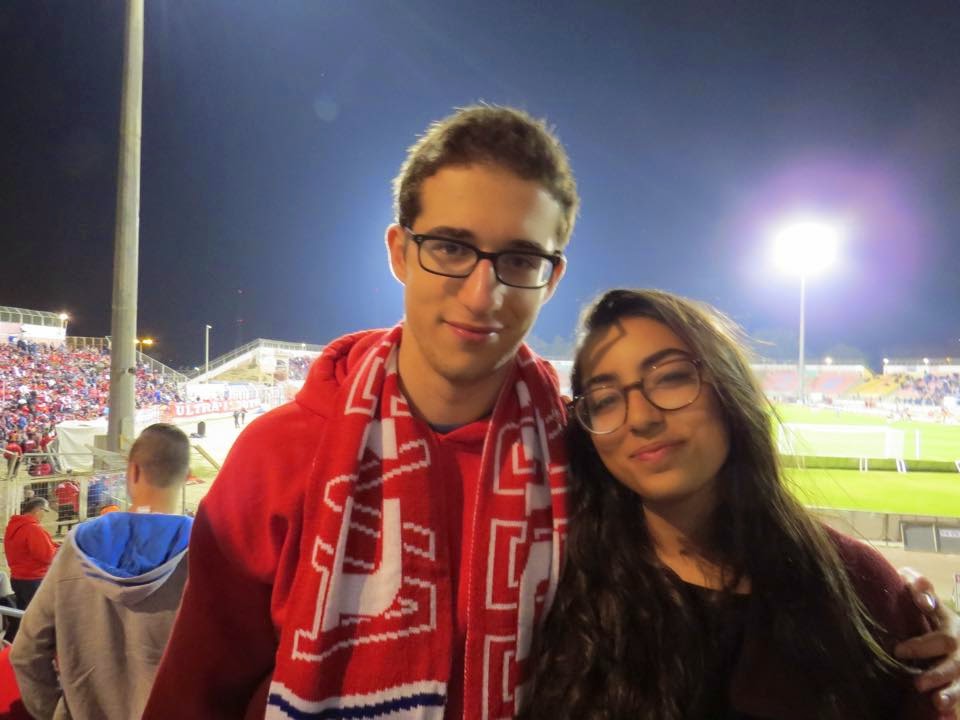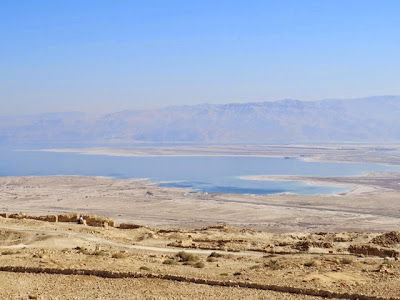When my mom first told me about the Diller Teen Fellows program about 2 years ago, I didn't really think much of it at first. It sounded like such a huge commitment for a three-week trip to Israel that I could do with any other program. And I must admit, when the workshops first started, I wasn't very happy to be there either. It was a lot of discussions about topics that didn't really appeal to me, and A LOT of seemingly pointless icebreakers. I really was not sure that I had made the right decision by joining the program at that point, and I know some other fellows were having similar thoughts as well. However, we were told that everything would all come together in Israel, and everything we were doing would 'all make sense then'. So I decided to give Diller a little more time, and looking back on that decision now, it was definitely the right one.
I started to realize this on the first Shabbaton
last October. Yamit was still our coordinator and for me, it was the first time
I really got to know some of the other fellows a little better. I remember
actually enjoying myself that Shabbaton both during the sessions and while
talking to some of the other fellows, which definitely made me more excited
about Israel and continuing with the program itself. Then, a few weeks later,
we were told that Yamit would no longer be our coordinator and that they were
in the process of looking for a new one. This news obviously came along with a
lot of uncertainty about the remainder of the program, but once again, we all
stuck with it and hoped for the best. And the best is exactly what we got when
we all met Sarah and went on our 2nd Shabbaton with her a few weeks later.
From that point on, time seemed to fly by and before
we knew it, the Israelis were in town for the North American Seminar and a week
of home hospitality. For
me, meeting the Israelis and spending time with them was definitely the most
interesting and exciting part of Diller. It was amazing to see how similar
these kids really were to us, despite living half way across the world and
leading very different lives from ours. Looking back, I think this is what
really makes Diller such a special program; they unite Jewish teens from
different corners of the world over a strong set of common values and beliefs.
Hosting the Israelis in our homes and spending that week with them was such an
amazing experience and a lot of fun for all of us. After that, we were all so
excited to come to Israel in the summer and spend an even longer period of time
with them.
And then, days before we were supposed to leave in
July, the bad news came. We would not be going to Israel this summer and the
trip was delayed indefinitely. After all the excitement leading up to the trip,
this was a pretty big let-down. Although we all for the most part understood and
agreed with the decision to cancel, I think it's safe to say that we were still
pretty disappointed, and understandably so. And for a 3rd time, we all had to
stay positive and hope for the best in terms of getting all we had hoped to get
out of Diller.
Before we knew it, December had come and we were
finally on a plane to Israel, where the best is once again exactly what we got.
Whoever it was that told us that everything would eventually come together in
Israel at the beginning of Diller was so right. I think we realized that all
the planning, all the discussions, and all the excitement that we had built up
in the year and a half leading up to Israel had paid off the minute we stepped
out of the Arrivals area at Ben Gurion airport, where we were greeted by the Israelis who
were cheering and who were as excited to see us as we were to see them.
The first three days in Israel were a great way to
start off the trip, and consisted of a good balance of fun activities and more
serious discussions about different values in Judaism that were relevant to
Diller and to being in Israel. We also visited Yad Vashem, which I found to be
a very powerful experience, having done the March Of The Living earlier this
year. On the fourth day of the trip, we travelled down to Be'er Sheva, the home
of our Israeli counterparts and the place where we would be spending the next 5
nights with our host families. Once again, this for me is simply the best part
of Diller, and that was definitely re-affirmed during these amazing 5 days. It
was so interesting to see the similarities and the differences in an Israeli
family's day-to-day life to ours, and it was really cool to experience life
through their eyes with them. And of course, we all had so much fun during that
week. Last but not least, after saying a sad goodbye to the Israelis, we
travelled to Sde Boker for the last two days of the trip for 'Kennes' with all
the other North American Dillers from around Canada and the US. Here, we had
the opportunity to once again meet some new people and engage in some pretty
interesting conversations with them, while also getting to hear an excellent guest
speaker in Avraham Infeld, who talked a little bit about Peoplehood, and what it means to be
Jewish. All in all, it turned out to be an amazing trip, and experience as a
whole. It was all we had hoped for and more.
I'll end on this note: At the beginning of our very
first workshop we had almost two years ago, one of our JCs told us all that
Diller was going to 'change us' and that it was going to be one of the best
experiences we had ever had. I also remember the exact thought that was going
through my mind at that moment: it might have changed them, but it certainly
won't change me. Now, I have about 20 new best friends in Israel that I will
stay in touch with and try to see whenever I am back there, 18 more people that
I have become very close with here in Montreal, and I can definitely say that because of Diller, I
think about certain things slightly differently. I often find myself referring
to the topic of a conversation I had in Diller while in the classroom, during
homework, and even in everyday life, and the leadership skills and values such
as Tikun Olam and the love of Israel will stay with me for the rest of my life.
So, does this mean Diller has actually changed me? To what would greatly
surprise my younger self, I believe so.
Written by Matthew Steinberg, Cohort 6















